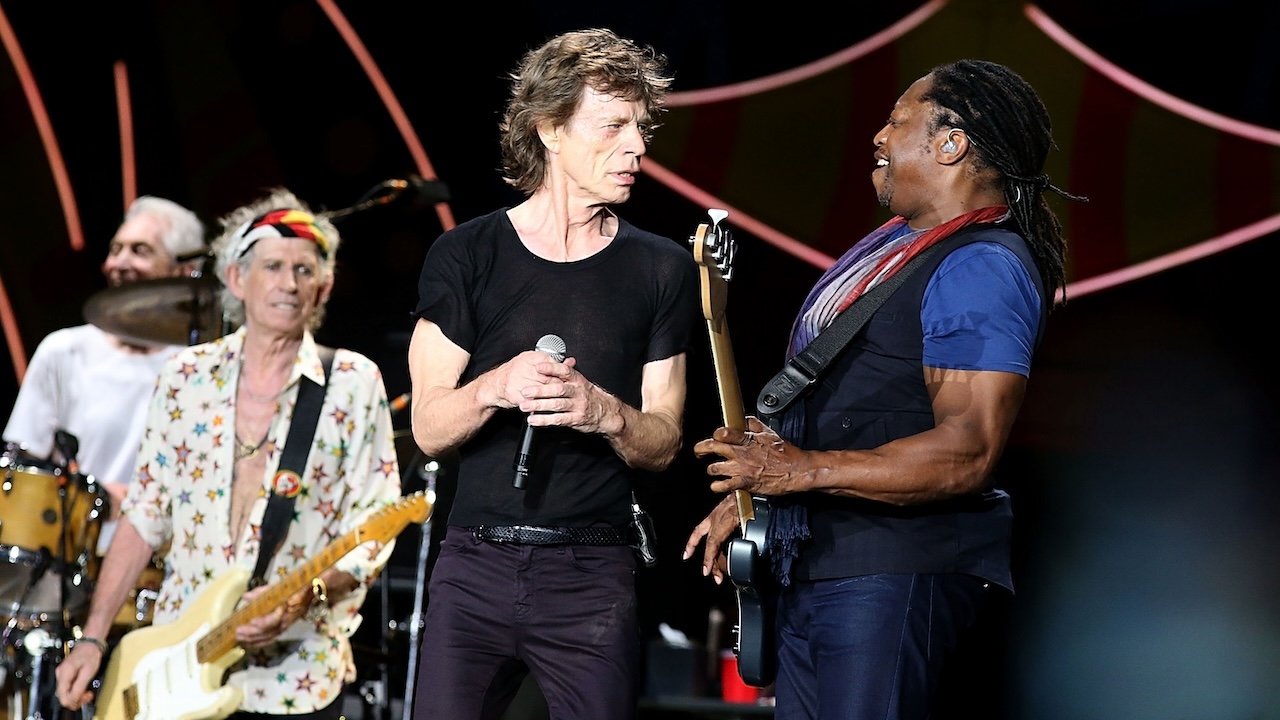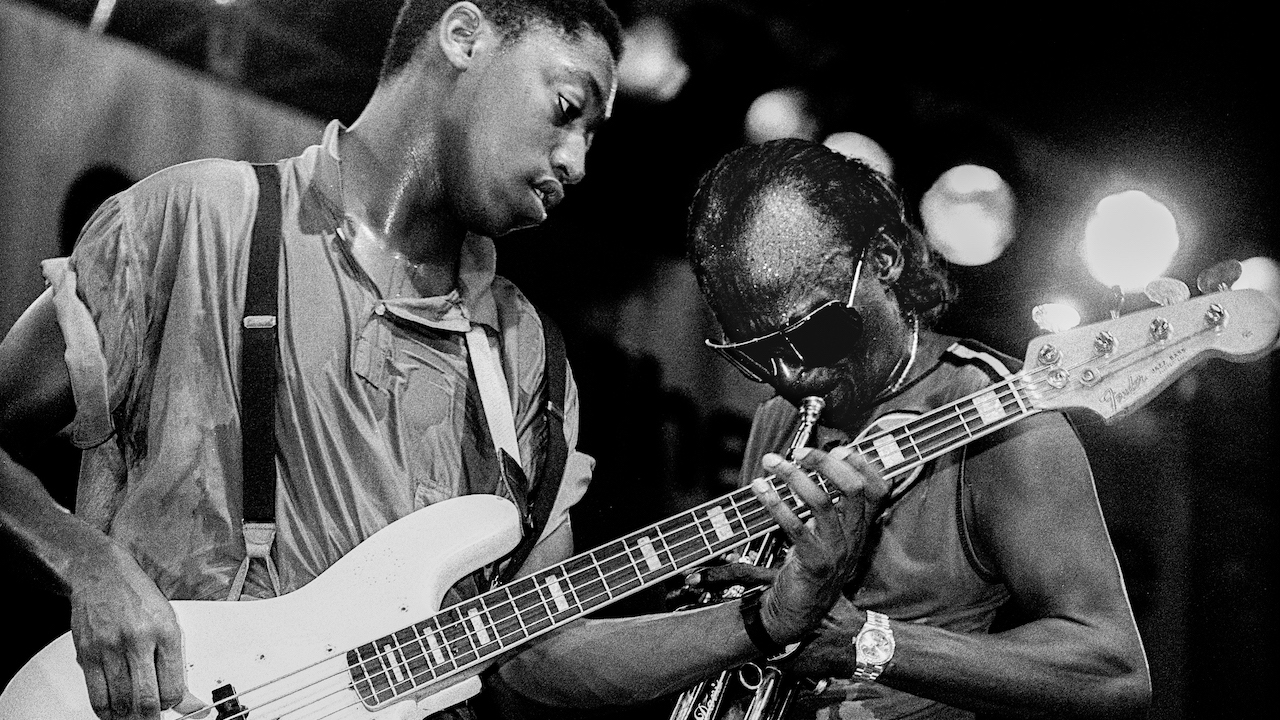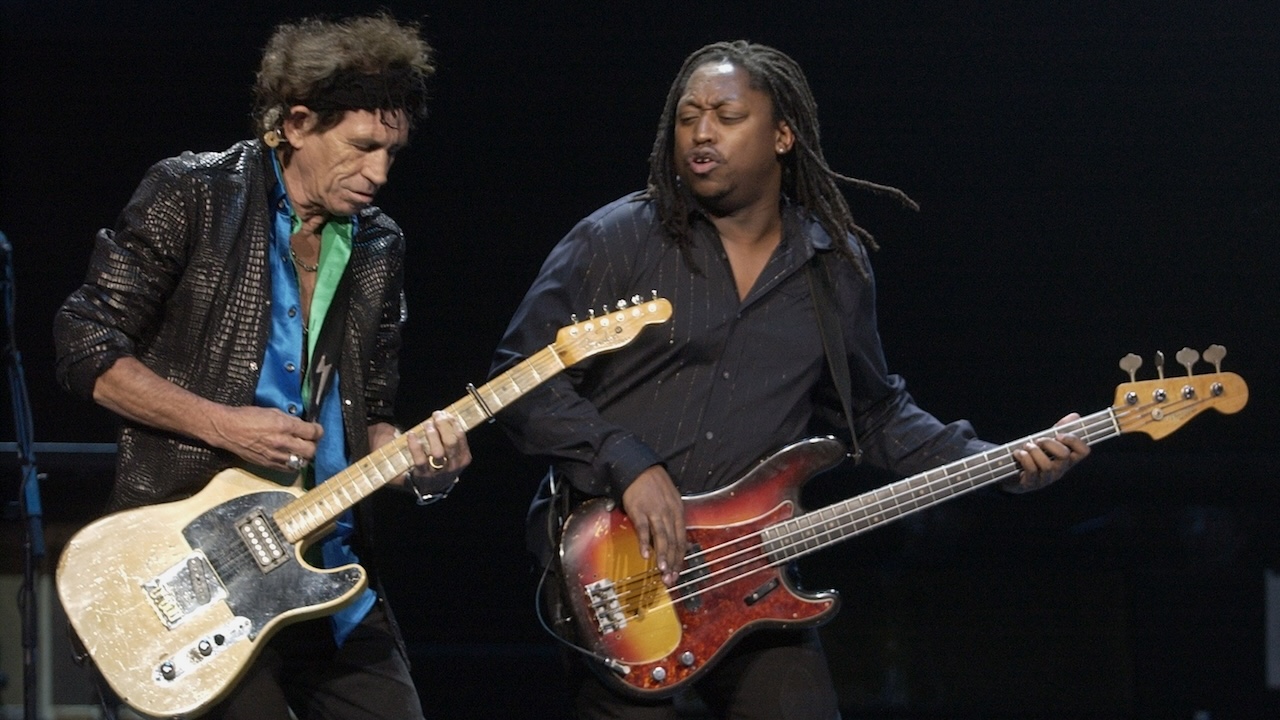“I said, ‘This is what Bill played’ and Mick said, ‘No no, don't play that!’” When he joined the Rolling Stones, Darryl Jones had to change the way he approached classic Bill Wyman basslines
The Rolling Stones bassist Darryl Jones looks back on joining the fold in 1993

You may, or may not, regard the Rolling Stones as innovators in their field; you may feel that their best days are long behind them. These are arguable viewpoints, but two essential elements are not open to debate: 1) the Rolling Stones are still a massive commercial presence; 2) their bassist since 1993, Darryl Jones, is himself a force of nature, with a stage and session career that is second to none.
Jones is a deeply serious fellow when asked about the nuts and bolts of his trade, but one who dissolves into laughter when recalling the more ‘unorthodox’ of his former employers (we're looking at you, M. Davis).
Born in Chicago in 1961, Jones made his bones with the aforementioned Miles at the age of only 21. After two albums with the ‘mercurial’ jazz icon, he joined Sting's all-star band for the Dream Of The Blue Turtles album in 1985, subsequently playing with Herbie Hancock, Madonna, Eric Clapton, the Headhunters, Peter Gabriel, and many more stellar artists.

Jones's full-time gig since 1993, however, has been with the Rolling Stones, taking Bill Wyman's place when the longtime bassist stepped aside. Note that this interview took place in June 2020, before the pandemic was announced, but even so, what a musician, and what a privilege.
Is a Stones tour a physically demanding exercise?
“Not physically, no. It's pretty cushy as far as touring goes. They don't do a lot of gigs, they don't do gigs back to back, and the travel and the hotels are all very nicely organized, so it's not a tough tour in that regard.
“There are certain things that are difficult, like being away from home and trying to eat right and stuff like that, but I've figured out my way to do that. I make a dash for a good health-food store when I get to a town, and get a few supplies, and I'm learning more about what works for me. So, no, it's not difficult.”
Get The Pick Newsletter
All the latest guitar news, interviews, lessons, reviews, deals and more, direct to your inbox!
What bass guitars do you take out with the Stones?
“I take a number of them out. For songs from the early 60s going into the 70s, I use some chambered instruments. I use a Fritz Brothers bass. They did a copy of the old Kay electric bass that's chambered – so it's hollow but it doesn't have any holes. It has a single lipstick-type pickup and it's really great for the early stuff, if you use a pick to get that kind of edgy, almost mod bass sound.”
“I also use a Fender Mustang, which is funny because I grew up playing one of those, when I was very young. I ran into one in a shop that was the exact same color as the one I played when I was a kid, and it was in really great shape, so I asked them to hold it for me because it was literally the bass of my childhood. I started playing it on some of the Stones' stuff and it sounded incredible.”
Where does the Mustang tone fit in?
“That's for songs like Start Me Up and (I Can't Get No) Satisfaction, and it sounds great, played with flatwound strings and a pick. People are now starting to get hip to the fact that short-scale basses have a very distinctive sound, I guess because of the string tension. What else am I using? I have a new Gretsch Thunder Jet bass, and I use a Music Man Stingray on the two or three Stones songs where a fretless is needed.”
You're also running a guitar company, Jones Musical Instruments.
“I'm really at the early stages, you know. I've got a Precision-style bass, which is called the Chatham bass, because I grew up in an area in the south side of Chicago called West Chatham, and a Jazz bass I call my Gresham bass, after a neighbourhood that's just near where I grew up. I play the Chatham bass on Miss You and in the little area in that song where I feature. I also use Laklands on a few tunes. I think that's about it for now.”
When you joined the Stones in 1993, did you play Bill Wyman's bass parts as he had recorded them, or did you add your own spin?
“You know, an interesting thing happened there. Before the audition, I went out and bought a bunch of Stones Greatest Hits records and started trying to figure out some basslines. That really showed me, even before the audition, that there was no way I was really gonna be able to learn these basslines verbatim.
“But there are certain things that Bill and whoever was playing bass – Keith was on a bunch of it, Ronnie's on some of it – did, that really are parts of songs. I try to cover those things, but I can't think of any song that I really try to play exactly like Bill played, you know.”
Do the other Stones have strong views about that?
“At one rehearsal, I figured out what Bill had played on Respectable, and I started playing it, and Mick was like ‘Where are you going?’ I said, ‘This is what Bill played on the song’ and he said ‘No, don't play that. Play what you hear.’
“So neither I nor they are that precious about that stuff. The first time I rehearsed with them, I asked Keith, ‘Hey man, did you play bass on this song?’ and he said ‘Yeah.’ I said ‘So what's the bassline?’ and he was like, I don't know, man. You're the bass player, you tell me what the bassline is!’
“So they're pretty cool about letting me do what I want. I still want to play the essence of the song. If there's something in the essence of the bassline that needs to be played to make the song what it is, they seem pretty trusting of me that I'll find those things. The rest they leave to me, basically.”
Some parts are very recognizable – the giant slide at the end of 19th Nervous Breakdown, for example.
“Oh yeah! That's a lot of fun to play, and that's why I use all the different instruments. The Fritz Brothers bass is great for getting that mids tone on She's So Cold. I use that for anything that sounds that way on record from that period.
“If you listen to what Bill was playing in 1985, then you're talking about roundwound strings, maybe on a Steinberger, so I try to choose the right bass. If it's a more modern sound, then I'll use one of the Jones instruments.”
What amp do you take out with the Stones?
“I use the Stones' old 1970s Ampeg SVT head as well as going back and forth with some newer SVTs, and I always use two SVT cabs. In addition to that, I've been using QSC gear, some of their K.2 series-the 18" subwoofer, and the K.12.2 cabs. Also, I got onto a couple of the Jonas Hellborg preamps that he did for Warwick a number of years ago: I've been using that to run in front of the QSC gear.”
Jonas is a guru of bass amplification.
“Yes, he's very well versed in that stuff. When I went over there, he told me that he had acquired a Neve board a few years before and had it shipped to his home in Sweden. After he got it he realized that no-one knew how to repair it, so he basically learned how to repair it himself. His preamp comes from some of the knowledge that he gained from that, because it does sound very warm and natural, like a Neve channel.”

“Anyway, the QSC gear is there for me to have a little bit more horsepower on stage, and the SVT is what is being recorded and what is basically going out from the bass, along with a direct signal, out to the front of house.”
It's a classic bass tone.
“The sound of an SVT for rock’n'roll – it's hard to beat that. That stuff has been part of the Stones repertoire for years. I've been using them almost 20 years now. When Dave Natale came on board as the soundman, he said that he'd found it to be a really great sound for rock'n'roll. The guys then said ‘We have an old SVT’, and they have great people who keep them working really good. They have a tube guy who looks at all the tube gear on stage and keeps it working great. So it's been either that or a newer head in terms of amplification.”
You don't have to carry your own amp, I assume.
“Not with them, no. I still work with some people who don't tour quite as luxuriously as the Stones do, so I'm not all the way out of that. I think my carrying gear days are mostly behind me, hopefully.”
Joel McIver was the Editor of Bass Player magazine from 2018 to 2022, having spent six years before that editing Bass Guitar magazine. A journalist with 25 years' experience in the music field, he's also the author of 35 books, a couple of bestsellers among them. He regularly appears on podcasts, radio and TV.
“When I first heard his voice in my headphones, there was that moment of, ‘My God! I’m recording with David Bowie!’” Bassist Tim Lefebvre on the making of David Bowie's Lazarus
“One of the guys said, ‘Joni, there’s this weird bass player in Florida, you’d probably like him’”: How Joni Mitchell formed an unlikely partnership with Jaco Pastorius













